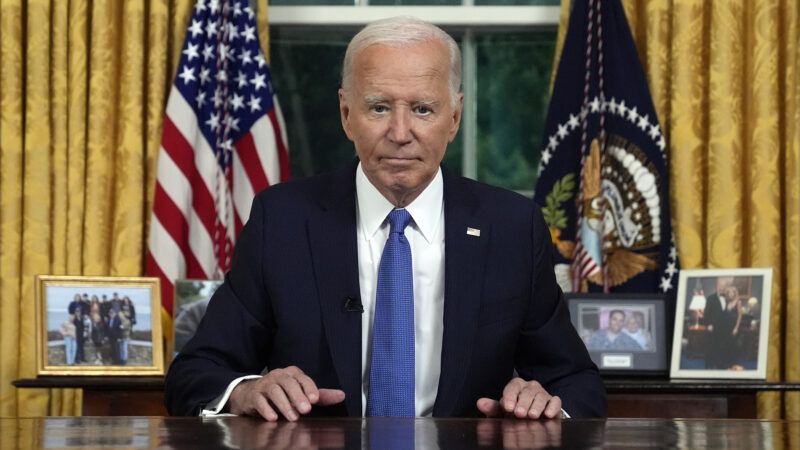Biden Brags That 'the United States Is Not at War' As He Bombs Yemen
The wars aren’t over. America is still fighting—directly and indirectly—in the Middle East, Africa, and Eastern Europe.

President Joe Biden called himself "the first president this century to report to the American people that the United States is not at war anywhere in the world" in a speech on Wednesday night. Less than an hour before Biden spoke those words, the U.S. military had announced that it was bombing Yemen again.
"In the past 24 hours, U.S. Central Command (USCENTCOM) forces successfully destroyed two Iranian-backed Houthi missiles on launchers in a Houthi-controlled area of Yemen," the U.S. military command responsible for the Middle East and Central Asia declared shortly before Biden's speech began. "It was determined these weapons presented an imminent threat to U.S., coalition forces, and merchant vessels in the region."
After completing the U.S. withdrawal from Afghanistan in 2021, Biden took credit for ending "the longest war in American history," what he called a "forever war." Yet the Biden administration has extended other U.S. forever wars—and introduced U.S. forces into new ones.
When Biden first ordered airstrikes on Yemen's Houthi movement in January, it was the first direct U.S. attack on the Houthis ever, and the first airstrike on Yemen by any force in two years. The U.S. had previously brokered a truce between the Houthi government in Sanaa and the rival Saudi-backed government in Aden.
But as war broke out in Gaza last year, the Houthis announced that they would attack Israeli-linked shipping in solidarity with the Palestinian cause. Foreign ships began avoiding the Red Sea off the coast of Yemen, a key international waterway, and Biden tried to reopen it by bombing the Houthis.
Asked by reporters whether the airstrikes were working, Biden gave a formula for endless war. "Well, when you say 'working,' are they stopping the Houthis? No. Are they going to continue? Yes," he said.
U.S. forces have also taken fire elsewhere in the Middle East due to the war in Gaza. Two weeks after U.S. airstrikes on Yemen began, Iraqi guerrillas killed three U.S. soldiers on the Jordanian-Syrian border with a drone strike. (It was part of a wave of dozens of attacks motivated by U.S. military support for Israel.) Biden bombed Iraqi militia sites in retaliation.
And older U.S. wars in the region continue to rage. Although both Biden and his predecessor Donald Trump have done victory laps, the Islamic State group is still around. In June 2024, the U.S. military assassinated a senior Islamic State group leader in Syria. The month before, it did the same in Somalia.
The Islamic State group isn't the only force that the U.S. is bombing in Somalia, a place where most Americans don't even know their country is at war. U.S. forces are fighting to prop up the Somali government against al-Shabab, another Islamist rebel group. U.S. Africa Command announced 15 airstrikes against al-Shabab in 2023 and six airstrikes this year.
That's not even counting U.S. proxy wars. Washington is providing a steady flow of weapons and intelligence to Ukraine and Israel, most of it at the American taxpayer's expense. While American fingers are not on the triggers and American personnel are not taking fire in Ukraine and Gaza—at least not yet—the Biden administration also owns those wars.
At the NATO summit in Washington earlier this month, U.S. officials co-signed a statement that Ukraine was on an "irreversible" path to joining the alliance. In other words, American troops may be pledged to defend Ukraine in a future war.
"We'll keep rallying a coalition of proud nations to stop [Russian President Vladimir] Putin from taking over Ukraine and doing more damage. We'll keep NATO strong," Biden said in his Wednesday night address. "I'll make it more powerful and more united than any time in all our history. Keep doing the same for allies in the Pacific."
Biden, like Trump, wants to have his cake and eat it too. He wants to take advantage of anti-war sentiment in the American public without being seen as compromising with rival powers or retreating from foreign conflicts. Biden's pitch is pretty similar to Trump's: "peace through strength." And when he can't deliver on that promise, he confuses and deceives the public.


Show Comments (88)